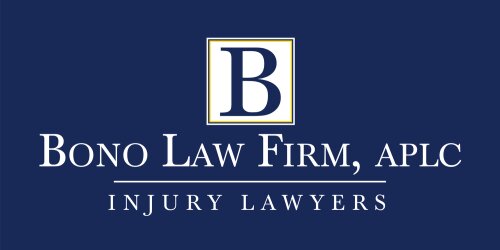Best Personal Injury Lawyers in United States
Share your needs with us, get contacted by law firms.
Free. Takes 2 min.
Or refine your search by selecting a city:
List of the best lawyers in United States
About Personal Injury Law in United States
Personal injury law in the United States is designed to offer legal remedies to individuals who have suffered harm due to the negligence, recklessness, or intentional actions of others. It covers a wide range of incidents, from car accidents and slips and falls to medical malpractice and product liability. The primary goal is to compensate the injured party for losses incurred, which may include medical expenses, lost wages, and pain and suffering. Understanding the nuances of personal injury law is crucial for ensuring fair and adequate compensation.
Why You May Need a Lawyer
There are several common situations where you may require legal assistance in a personal injury case:
- Severe Injuries: If your injuries are severe and long-term, you may face significant medical expenses and life changes. Legal expertise can help secure adequate compensation.
- Disputed Liability: When fault is unclear or contested by the parties involved, a lawyer can help establish responsibility through evidence and negotiation.
- Complex Legal Procedures: Navigating the legal system, with its forms and deadlines, can be daunting. A lawyer can help manage these complexities.
- Insurance Company Denial: If an insurance company denies your claim or offers an unfair settlement, legal representation can be crucial in negotiating a fair outcome.
- Multiple Parties Involved: Cases involving multiple defendants or insurance policies can be complicated, requiring a strategic approach to ensure liability is appropriately assigned.
Local Laws Overview
Personal injury laws can vary significantly from one state to another. However, there are some key aspects that are generally relevant across the United States:
- Statute of Limitations: There is a limited time period within which you must file a personal injury claim, which differs by state.
- Negligence Laws: Most states follow comparative negligence laws, allowing you to recover damages even if you are partially at fault, albeit reduced by your percentage of fault.
- Damages Cap: Some states impose caps on certain types of damages (such as non-economic damages) in personal injury cases.
- No-Fault States: In certain states, like Florida, no-fault laws require you to turn to your insurance company to cover immediate expenses, regardless of who is at fault.
Frequently Asked Questions
What is a personal injury claim?
A personal injury claim is a legal process through which an injured party seeks compensation from the person or entity responsible for their injuries.
How long do I have to file a lawsuit?
The statute of limitations varies by state and the nature of the claim, but it's typically between one and six years. It's critical to consult with an attorney promptly to avoid missing deadlines.
How is compensation calculated in personal injury cases?
Compensation is determined based on medical expenses, lost wages, loss of earning capacity, pain and suffering, and other factors. Every case is unique, and a lawyer can assist in evaluating the full extent of damages.
Should I accept the insurance company's first settlement offer?
It's generally advisable to consult with an attorney before accepting any offers. Initial offers are often lower than what you might be entitled to.
Can I still sue if I was partially at fault?
Yes, in states with comparative negligence laws, you can still file a claim; however, your compensation may be reduced by your percentage of fault.
Is a personal injury lawyer necessary?
While not mandatory, a personal injury lawyer can be extremely beneficial in navigating complex legal systems, negotiating settlements, and ensuring you receive full compensation for your injuries.
What is the difference between a claim and a lawsuit?
A claim is made with an insurance company, while a lawsuit is filed in court if a settlement cannot be reached.
What if I can't afford a lawyer?
Many personal injury lawyers work on a contingency fee basis, meaning they only get paid if you win your case. This allows access to legal services without upfront costs.
What should I do immediately after an accident?
Seek medical attention, document everything (photos, witness contact information), report the incident, and contact a personal injury lawyer as soon as possible.
How long does it take to resolve a personal injury case?
The time frame varies widely, from months to several years, depending on the complexity of the case, negotiation process, and whether it goes to trial.
Additional Resources
Consider reaching out to the following resources for more information and assistance:
- American Bar Association: Provides a directory of accredited personal injury lawyers.
- State Bar Associations: Offers resources specific to your state and can assist in finding local legal help.
- National Center for State Courts: Offers guidance on navigating the court system in your state.
- Consumer Safety Organizations: Groups like the National Safety Council provide valuable information on preventing accidents and understanding legal rights.
Next Steps
If you require legal assistance in a personal injury matter, consider the following steps:
- Consult a Lawyer: Reach out to a reputable personal injury attorney for a consultation to discuss your case.
- Gather Documentation: Compile any evidence, medical records, and documentation related to the incident to support your case.
- Understand Your Rights: Familiarize yourself with local laws and your rights to ensure a smooth legal process.
- Take Legal Action: Follow the advice of your legal counsel to proceed with claims or lawsuits as appropriate.
Lawzana helps you find the best lawyers and law firms in United States through a curated and pre-screened list of qualified legal professionals. Our platform offers rankings and detailed profiles of attorneys and law firms, allowing you to compare based on practice areas, including Personal Injury, experience, and client feedback.
Each profile includes a description of the firm's areas of practice, client reviews, team members and partners, year of establishment, spoken languages, office locations, contact information, social media presence, and any published articles or resources. Most firms on our platform speak English and are experienced in both local and international legal matters.
Get a quote from top-rated law firms in United States — quickly, securely, and without unnecessary hassle.
Disclaimer:
The information provided on this page is for general informational purposes only and does not constitute legal advice. While we strive to ensure the accuracy and relevance of the content, legal information may change over time, and interpretations of the law can vary. You should always consult with a qualified legal professional for advice specific to your situation.
We disclaim all liability for actions taken or not taken based on the content of this page. If you believe any information is incorrect or outdated, please contact us, and we will review and update it where appropriate.
Browse personal injury law firms by state in United States
Refine your search by selecting a state.















